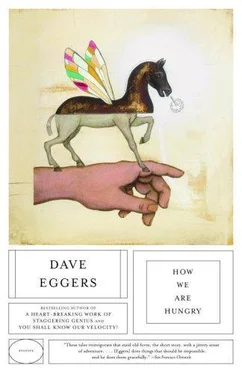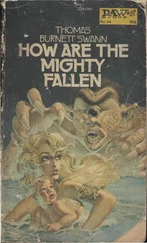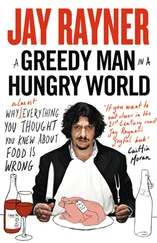Dave Eggers - How We Are Hungry
Здесь есть возможность читать онлайн «Dave Eggers - How We Are Hungry» весь текст электронной книги совершенно бесплатно (целиком полную версию без сокращений). В некоторых случаях можно слушать аудио, скачать через торрент в формате fb2 и присутствует краткое содержание. Год выпуска: 2005, Издательство: Vintage Canada, Жанр: Современная проза, на английском языке. Описание произведения, (предисловие) а так же отзывы посетителей доступны на портале библиотеки ЛибКат.
- Название:How We Are Hungry
- Автор:
- Издательство:Vintage Canada
- Жанр:
- Год:2005
- ISBN:нет данных
- Рейтинг книги:3 / 5. Голосов: 1
-
Избранное:Добавить в избранное
- Отзывы:
-
Ваша оценка:
- 60
- 1
- 2
- 3
- 4
- 5
How We Are Hungry: краткое содержание, описание и аннотация
Предлагаем к чтению аннотацию, описание, краткое содержание или предисловие (зависит от того, что написал сам автор книги «How We Are Hungry»). Если вы не нашли необходимую информацию о книге — напишите в комментариях, мы постараемся отыскать её.
A Heartbreaking Work of Staggering Genius
How We Are Hungry — читать онлайн бесплатно полную книгу (весь текст) целиком
Ниже представлен текст книги, разбитый по страницам. Система сохранения места последней прочитанной страницы, позволяет с удобством читать онлайн бесплатно книгу «How We Are Hungry», без необходимости каждый раз заново искать на чём Вы остановились. Поставьте закладку, и сможете в любой момент перейти на страницу, на которой закончили чтение.
Интервал:
Закладка:
But there’s something appealing about the distance, Derek says. Watching from the fifty-yard line of a football field, if Basil were in the center of that field, would be much more palatable than being in very close quarters. Derek has watched a firefighter friend of his stop breathing, in a pickup truck, after withstanding burns over most of his body. He was overwhelmed by how hard it was to watch the breaths stop, each one quieter, by half, than the last. It would be better, he insists, if there can be a comfortable remove.
They clarify what Basil wants: He wants hundreds if not thousands of people. He wants there to be distance if desired. He wants to be able to meet people. There should be an optional receiving line, where people can come to him and wish him well, touch his hand or shoulder. Much like at a wake, though this would be for a still-living person, which makes more sense, of course. A conversation between Derek and Basil:
DEREK: Do you want to limit the receiving line to people you know?
BASIL: No, no. Anyone.
DEREK: So complete strangers should be able to come up and say hello, goodbye?
BASIL: Yes.
DEREK: But people are strange. Many people are strange. Aren’t you afraid there’d be some strange person out there?
BASIL: At a thing like this? It’ll be self-selecting, don’t you think? People are strange, but more than that, they’re good. They’re good first, then strange.
DEREK: I guess. But there’ll be Goth types, I bet. And evangelicals.
Should there be any kind of entertainment? Helen wants to know this. An orchestra? The event could be a concert. The whole departure set to music. This idea is accepted by all as a good one. Maybe the music follows a certain cycle, birth to death, music nodding to all the stages between.
Basil now is attached to the idea of music. Nothing too loud, though. No crashing cymbals.
They briefly consider simply having an event where they open a stadium and invite the public to come and say goodbye to a man named Basil.
The story could be called “All Say Goodbye to a Man Named Basil.”
Maybe they do a test run, at a smaller venue. They place an ad in the paper, with words like those above, and that’s all. They wait and wait and only seven people show up, and all of them quickly leave when they see only Basil, Helen and Derek.
They are getting closer to a solution. They know that the event should be large, and there should be music and perhaps some dancing, if relatively slow. No crazy dancing, Basil says. But slow dancing, waltzing, that kind of thing would be nice.
Basil himself is not so good at articulating why he wants this to be so, but his son and his friend Helen, in convincing others to help or attend, become the explainers. One sample conversation, between Derek and the Russian-born conductor of the Memphis Symphony, which Derek is attempting to get to play the event:
DEREK: I think he just really likes to be around people. Lots of people.
NIKITA: So why doesn’t he just shoot himself in the middle of a hockey game or something? Sorry, that’s not funny, I guess.
DEREK: He doesn’t want to foist himself upon people. He wants their attendance to be voluntary. We were thinking it would be a concert, and you could conduct.
NIKITA: It is almost Russian in its gruesomeness.
DEREK: We hope it will be beautiful.
NIKITA: There has not been a beautiful death in the history of mankind.
There is some talk about what kind of precedent all this sets. A conversation between Helen and her assistant:
ASST: I think it’s great, but what if everyone wanted to do this? The country would be sending off everyone with parades and parties and concerts.
HELEN: There’s nothing wrong with that. We already have Lifetime Achievement Awards — everyone gets one of those now. And besides, there aren’t that many Basils out there. I think this is seen as very strange behavior, and there are few people my age who go in for this sort of thing. For most, just the family around is fine, if that.
ASST: Aren’t there elephants who go away from everyone to die? They go find a quiet place?
HELEN: I think most elephants do that. Lots of animals do, I think. Cats. Rhinos.
ASST: But are there animals that do this, animals that want to pass away in the company of thousands? I don’t think so.
There is some discussion about whether or not there should be food, and Basil decides that food is fine. Wine would be good, though he’s against beer or liquor, which might make the crowd too boisterous. But wine would be mellowing, he decides. Red wine, a cash bar.
There was that story of the Roman, Petronius, who was Nero’s party planner. He had to come up with a better event every night, had to make each one more elaborate, bizarre, unforgettable. The story goes that one night he placed a tub in the middle of the festivities, and put himself in the tub. He then slit his wrists, letting the blood drain slowly into the tub. Periodically he would wrap his wrists, temporarily stanching the bleeding, to talk to a guest or two. But slowly he did die at that party, for those people.
Basil knows this story, and wants to make sure his is not like that. Helen agrees, and brings up an interesting point: for this to work, to have any dignity — to allow dignity to Basil and those watching — it has to be about Basil, not the audience. There can’t be any motives in watching outside of Basil’s asking them to be there, and their wanting to be present for an important moment in a stranger’s life. Much like people cheer for those passing in a parade, though they don’t know them.
Basil can’t decide if this should be a daytime or nighttime event. During the day, it would seem more open and festive and light, and he would be able to see people’s faces, if he chose. But at night, it could certainly be more beautiful, with everyone holding candles and the stars above. Ultimately he decides to compromise: it will be dusk.
There is a rich and melancholy undercurrent between Basil and Helen. They haven’t been in contact for many decades, but now find themselves having great fun together, making each other laugh — Helen laughs with her stomach, her shoulders, and her face runs crimson quickly — and marveling at the other’s strength and will. It’s unfortunate that they came together again while she was essentially helping him to die. There is some hint that they might have a brief fling, but they decide not to bother. Basil’s bones feel hollow, seashells stitched together with wire. Instead they can only shake their heads about the fact that they might have had many years of happiness together, alas. She also collects cacti.
Basil’s older brother is either very sharp and feisty, or has lost his lucidity and lives in a constant-care facility. Probably the latter.
Someone, one of the daughters, proposes that the death could be on closed-circuit TV, allowing anyone to see it (though limiting the potential for public humiliation). This idea is rejected. It’s not about the number of eyes watching from afar, Basil and Derek explain, it’s about being in the company of many, feeling their heat.
Interesting sidenote: Basil only has so long to live, but his longevity depends to a certain extent on a relatively low-impact existence. But when he starts running around, planning this, making phone calls and getting into his car to scout locations and meet with people, he’s stuck in a paradox. His very planning for the event is taking days off his life, which means he needs to work even harder, because his final day keeps moving up.
At some point Basil should have some doubts about it. After the preparations have been made. Maybe in the middle of the planning. Better: he calls it off when it’s seeming too difficult. They haven’t had much success with the arrangements, and he feels awful that it’s taken Derek and Helen so much time to even get this far. He calls it off and Helen and Derek are actually somewhat relieved. They’d believed in him, and in the project, but are relatively happy to move on. A quiet death is a good death. It can be beautiful that way.
Читать дальшеИнтервал:
Закладка:
Похожие книги на «How We Are Hungry»
Представляем Вашему вниманию похожие книги на «How We Are Hungry» списком для выбора. Мы отобрали схожую по названию и смыслу литературу в надежде предоставить читателям больше вариантов отыскать новые, интересные, ещё непрочитанные произведения.
Обсуждение, отзывы о книге «How We Are Hungry» и просто собственные мнения читателей. Оставьте ваши комментарии, напишите, что Вы думаете о произведении, его смысле или главных героях. Укажите что конкретно понравилось, а что нет, и почему Вы так считаете.












